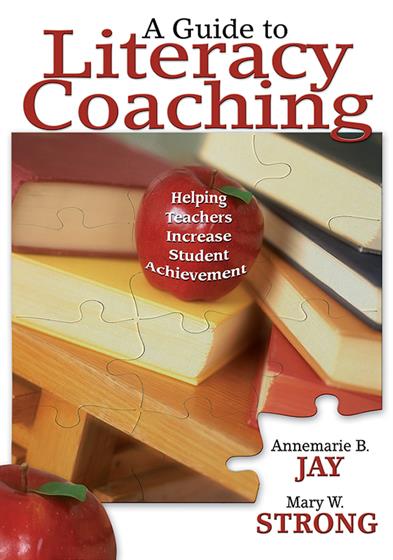
Hands-on, Practical Guidance for Educators
From math,
literacy, equity, multilingual learners, and SEL, to assessment, school counseling,
and education leadership, our books are research-based and authored by experts
on topics most relevant to what educators are facing today.
A Guide to Literacy Coaching
An essential guide to the "what" and the "how" of literacy coaching!
This practical resource presents effective coaching strategies and best practices for enhancing literacy instruction and student performance across all grade levels. Ideal for individual or group professional development, this text covers skill requirements for coaching and describes four roles of effective coaches: facilitator, observer, colleague, and learner. Sample scenarios and advice from experts help connect theoretical and everyday issues. Other highlights include:
- Information on NCLB, Reading First, and Reading Next
- Insight into developing relationships with school administrators
- Tips for coaching difficult or noncompliant teachers
- Practical recommendations for first-year coaches
- Grade Level: PreK-12
- ISBN: 9781412951555
- Published By: Corwin
- Year: 2008
- Page Count: 296
- Publication date: April 29, 2008
Price: $44.95
For Instructors
When you select 'request review copy', you will be redirected to Sage Publishing (our parent site) to process your request.
Description
"A very hands-on approach to helping teachers, parents, students, and the community. Coaches are not only given the theory behind what they do, but also the knowledge of how to implement the research and theory."
—Emme Barnes, Literacy Facilitator
Hawk Ridge Elementary, Charlotte, NC
"This superior text clarifies the responsibilities, qualifications, and capabilities of the coach within and without the school and as a leadership partner."
—Connie Molony, Reading-Language Arts Specialist
Fargo Public Schools, ND
An essential guide to the "what" and the "how" of literacy coaching!
Literacy coaches regularly encounter practical and theoretical issues, ranging from decoding national and state coaching requirements to understanding how to work effectively with all students, including those with special needs. This practical guide presents effective coaching strategies and best practices for enhancing literacy instruction and student performance across all grade levels.
Ideal for individual or group professional development, this text covers skill requirements for coaching and describes four roles of effective coaches: facilitator, observer, colleague, and learner. Readers will find sample scenarios, advice from recognized literacy experts, and topic extensions for study groups, as well as:
- Information on NCLB, Reading First, and Reading Next requirements
- Insight into developing relationships with school administrators
- Tips for coaching difficult or noncompliant teachers
- Practical recommendations for first-year coaches
A Guide to Literacy Coaching illuminates the many practical strategies literacy coaches, mentors, teacher leaders, and staff developers can use to collaborate with multiple school constituencies to promote teacher development and schoolwide literacy success.
Key features
- Links to requirements of NCLB, Reading First and Reading Next
Author(s)

Annemarie B. Jay
She spent most of her career as a K–12 language arts curriculum coordinator for a large school district. She also served as an elementary principal and as a supervisor of elementary education and federal programs during her 30 years of pubic school experience. A hands-on administrator, Jay spent a significant amount of her time coaching teachers about literacy practices.
Jay is currently the president-elect of the Keystone State Reading Association (KSRA) and also serves on the Long Range Planning Committee. She is also the president of the Delaware County Reading Council, her local council in Pennsylvania, for which she writes a bi-monthly online newsletter.
A reviewer for publications of the International Reading Association and the Keystone State Reading Association, Jay is also a frequent presenter at the local, state, and national levels about literacy teaching and learning.
She is a graduate of the Governor’s Institute on Early Childhood Education. After earning her PhD from the University of Pennsylvania, Jay served as an adjunct professor at the University of Pennsylvania and Saint Joseph’s University in Philadelphia for many years.

Mary W. Strong
Before entering higher education, she was a classroom teacher and reading specialist at the primary and middle school levels in Pennsylvania, Ohio, and West Virginia. She also served as an elementary school principal for 20 years in West Virginia, and the schools she led won a National Rural and Small Schools Consortium Award and the National Council of Teachers Award for Programs for Schools at Risk.
Strong has given presentations on literacy education at conferences of the International Reading Association, National Reading Conference, College Reading Association, American Education Research Association, National Association of Elementary School Principals, and Association of Childhood Education International. She has had articles published in the Reading Professor, Reading Horizons, Journal of Reading Education, Delta Kappa Gamma Bulletin, and Day Care and Early Childhood. Additionally, she is on the editorial review board of Journal of Literacy Research and the Journal of Adolescent and Adult Literacy.
In other leadership roles, currently she is a member of the International Reading Association’s Bylaws and Resolutions Committee and the former chair of the Teacher Awards and Grants Committee. She is the secretary/treasurer of the Language Experience Special Interest Group of IRA and has served as a board member to that group.
As an active member of the Keystone State Reading Association (KSRA), she is on the editorial review board of Pennsylvania Reads: A Journal of the Keystone State Reading Association and is the chair of the Community Involvement State Committee. She has also served as president of the Pennsylvania Reading Teacher Educators, a special interest group of KSRA. Presently, she is vice president of the Delaware Valley Reading Council.
Table of Contents
List of Figures
List of Resources
Foreword by Rita Bean
Preface
Acknowledgments
About the Authors
1. The Nature of Literacy Coaching in America's Schools
Introduction
Why Literacy Coaching Is Important
What Is a Literacy Coach?
What Are the Differences Between a Literacy Coach and a Reading Specialist?
Coaching Labels
Position Statements on the Literacy Coach
Role and Qualifications of the Literacy Coach
Standards for Middle and High School Literacy Coaches
Literacy Coaching Clearinghouse
Literacy Coaching Certification Throughout the United States
An Expert's Thoughts: Dr. Cathy Roller
Summary
Topic Extensions for Class Sessions or Study Groups
2. The Multiple Roles of the Literacy Coach: Facilitator, Observer, Colleague, and Learner
Introduction
Scenario
Coach as Facilitator
Coach as Observer
Coach as Colleague
Coach as Learner
An Expert's Thoughts: Dr. Jack Cassidy
Summary
Topic Extensions for Class Sessions or Study Groups
3. Assistance and Resources for New and Experienced Literacy Coaches
Introduction
Scenario
A Glimpse at First-Year Coaching
An Expert's Thoughts: Dr. Roger Farr
The Coach's Assignment
Resources and Assistance Available to Literacy Coaches
An Expert's Thoughts: Dr. Shelley Wepner
Summary
Topic Extensions for Class Sessions or Study Groups
4. The Schools in Which We Work
Introduction
Scenario
Primary/Elementary School Settings
Middle and High School Settings
Special Education Classroom Settings
Two Experts' Thoughts: Dr. Richard Vacca and Dr. JoAnne Vacca
Summary
Topic Extensions for Class Sessions or Study Groups
5. The Communities in Which We Work
Introduction
Scenario
Parents: Groups and Individuals
Linking Teachers to Professional Organizations
Government Relations
An Expert's Thoughts: Dr. Jesse Moore
Linking to Other Literacy Agencies
An Expert's Thoughts: Dr. Linda Katz
Summary
Topic Extensions for Class Strategies or Study Groups
6. Literacy Leadership
Introduction
Scenario
The Leadership Role
Working With School Administrators
An Expert's Thoughts: Dr. Ken Koczur
Summary
Topic Extensions for Class Sessions or Study Groups
7. Collaboration With Classroom Teachers
Introduction
Scenario
Coaching the Struggling Teacher
Coaching the Noncompliant Teacher
An Expert's Thoughts: Laura Richlin, Literacy Coach
Summary
Topic Extensions for Class Sessions or Study Groups
8. Collaboration With Other Professionals and School Personnel
Introduction
Scenario
Collaborating Within the School
Collaboration Outside the School
Collaboration Through Professional Development
An Expert's Thoughts: Theresa Manfre, Reading Specialist
Summary
Topic Extensions for Class Sessions or Study Groups
9. Assessment: Focus on Student Achievement
Introduction
Scenario
Collecting and Analyzing Data
Schoolwide Data
Classroom Data
Observation Data
Report Writing
An Expert's Thoughts: Dr. Richard Allington
Summary
Extension Topics for Class Sessions or Study Groups
10. Major Reports That Impact Literacy Coaching
Introduction
Scenario
What the Literacy Coach Should Know About the National Reading Panel Report
What the Literacy Coach Should Know About the Reading First Initiative
What the Literacy Coach Should Know About Reading Next: A Vision for Action and Research in Middle and High School Literacy
What the Literacy Coach Should Know About the RAND Report
What the Literacy Coach Should Know About Reading at Risk: A Survey of Literacy Reading in America
How Do Literacy Coaches Obtain Needed Knowledge?
Summary
Topic Extensions for Class Sessions or Study Groups
References
Index
Reviews
"The book outlines how effective coaching models can be implemented and is very clear about what a coach should be doing to perform their duties. The interviews with experts contain helpful information and lots of viewpoints."Victoria Seeger, Literacy Coach
Seaman USD 345, Topeka, KS
"Contains a wealth of knowledge, techniques, report forms, checklists, and research to support someone working in literacy coaching."Dolores M. Hennessy, Reading Specialist
Sarah Noble School, New Milford, CT
"The book shows the differences between a reading specialist and a literacy coach and then goes on to explain all the work of a literacy coach."Amy Q. Blocher, Reading Coach
Polk County School Board, FL
"A very hands-on approach to helping teachers, parents, students, and the community. Coaches are not only given the theory behind what they do, but are given the knowledge of how to implement the research and the theory. As a coach who tries to stay on top of current research, I really enjoyed reading the various perspectives offered by the experts on the different topics. In addition, the discussion sections at the end of each chapter will be beneficial for people new to the profession or who are learning about this profession in graduate school."Emme Barnes, Literacy Facilitator
Hawk Ridge Elementary, Charlotte, NC
"A valuable addition to the descriptive literature on the role of literacy coaches. This superior text clarifies the responsibilities, qualifications, and capabilities of the coach within and without the school and as a leadership partner."Connie Molony, Reading-Language Arts Specialist
Fargo Public Schools, ND
"A terrific resource for reading coaches. It brings to light the need for certification or a means for getting qualified coaches. There aren't a lot of books on coaching, and I found this one to be very enlightening."Carrie Dillmore, Reading Coach
Peace River Elementary School, Port Charlotte, FL
"From sample scenarios and coaching challenges to details on developing coaching relationships with school administrators, this book is packed with important coaching keys to success."The Bookwatch, July 2008
Midwest Book Review
For Instructors
When you select 'request review copy', you will be redirected to Sage Publishing (our parent site) to process your request.

